NYPD raids Columbia University, dozens arrested: All you need to know
The protests at Columbia University began on April 18 as part of a broader wave of demonstrations on college campuses across the US against Israel's war on Gaza
)
Demonstrators on the campus of Columbia University on April 29.Photographer: Alex Kent/Getty Images
Columbia University in New York City has been the epicentre of a heated standoff between pro-Palestinian protesters and law enforcement, with the situation escalating into a full-scale confrontation on the night of April 30. The New York Police Department informed on Wednesday that they have arrested over a dozen student protestors from the Columbia University campus.
The protests at Columbia University began on April 18 as part of a broader wave of demonstrations on college campuses across the United States in support of the Palestinian cause amid the ongoing conflict with Israel. The protests at Columbia were sparked by students demanding that the university divest from investments that support weapons manufacturing and Israel.
The protests escalated when dozens of protesters took over a building at Columbia University, barricading entrances and unfurling a Palestinian flag on April 23. The university threatened to expel the student protesters who refused to leave the occupied building by a given deadline.
Meanwhile, allegations of antisemitism have surfaced in the wake of protests in the US, with reports from Jewish students detailing threats and derogatory remarks. Activists involved in the protests have countered these claims, suggesting that accusations of antisemitism are being exaggerated to suppress criticism of Israel.
An encampment for divestment
Students started setting up a protest encampment in the centre of Columbia's campus in the third week of April, building tents in upper Manhattan's campus lawn. The student protesters said they would occupy the lawn until the university divests from companies that they believed profit from Israel's war on Gaza.
Also Read
Action by Columbia University against protestors
When the protesters did not comply, Columbia began suspending the students, with the school's spokesperson stating that "Protesters have chosen to escalate to an untenable situation — vandalising property, breaking doors and windows, and blockading entrances — and we are following through with the consequences we outlined yesterday".
In response to the protests, Columbia University implemented a strict resident-only lockdown last week, with students and staff denied entry to the campus and classes moving online.
Police action in Columbia University
Officers were seen entering Hamilton Hall on May 1, where protesters had barricaded themselves, using ladders to access upper floors while others dismantled the nearby encampment amid jeers and chants of "Shame, shame!" from onlooking students.
The university administration had authorised police action following an escalation in protest activities, including breaking windows and seizing control of the building, which had been renamed "Hind's Hall" by demonstrators in memory of a Palestinian child killed in Gaza.
Columbia said it had called the police to campus for the second time in less than two weeks after the building, Hamilton Hall, was "vandalised and blockaded." The university's president, Nemat Shafik, asked the NYPD to maintain a presence on campus through at least May 17 to prevent further encampments or occupations.
Earlier last week, the NYPD had arrested 108 protestors for trespassing, clearing the protest site.
Protests spread across other US universities
The Columbia protests have inspired similar demonstrations at other universities, with police clearing out protest encampments and making arrests at campuses across the country, including the University of Texas at Austin, Virginia Commonwealth University, and the University of Southern California.
Meanwhile, Boston police, armed with riot gear, detained 102 protestors while clearing a camp at Northeastern University on April 27. Security was also seen loading tents in the back of a truck. In a statement, the university claims "virulent anti-Semitic slurs, including 'Kill the Jews'", were raised at the encampment, as per AFP.
The protests even spread to Australian Universities last week. University of Sydney students set up a camp on April 23. The camp has consistently had more than 40 and up to about 60 campers each night, with a rally last Wednesday drawing about 200 people.
The movement has since spread – with the University of Melbourne joining on April 25, while camps were established on April 29 at the University of Queensland and the Australian National University in Canberra.
Protesters say the camps will remain until their demands are met.
White House expresses concern
The White House has expressed concern over the student occupations, with a National Security Council spokesperson stating that President Joe Biden believes students occupying an academic building is "absolutely the wrong approach".
A history of protests in Columbia University
The Columbia protests echo the university's history of student activism, with the current demonstrations drawing comparisons to the contentious protests that took place at Columbia in 1968 over the university's ties to the Vietnam War and treatment of minority students.
However, the current conflict has also sparked concerns about antisemitism, with some Jewish students feeling uneasy on campus.
Authorities, including the NYPD and university administration, have expressed concerns about safety and disruptions caused by the protests, leading to the forceful intervention to clear the protesters.
Meanwhile, public reactions have been mixed, with some criticising the protests as anti-Semitic while others support the students' right to advocate for Palestinian rights. Mayor Eric Adams has also hinted at involvement by "outside agitators," though this claim is disputed by protest leaders.
(with inputs from agencies)
More From This Section
Don't miss the most important news and views of the day. Get them on our Telegram channel
First Published: May 01 2024 | 1:07 PM IST


